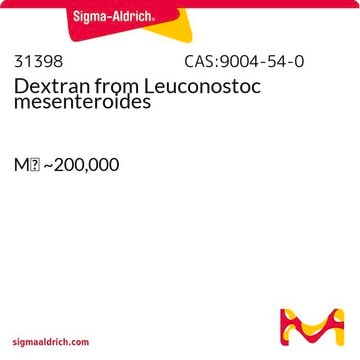If this product has an expiration or retest date, it will be shown on the Certificate of Analysis (COA, CofA). If there is no retest or expiration date listed on the product's COA, we do not have suitable stability data to determine a shelf life. For these products, the only date on the COA will be the release date; a retest, expiration, or use-by-date will not be displayed.
For all products, we recommend handling per defined conditions as printed in our product literature and website product descriptions. We recommend that products should be routinely inspected by customers to ensure they perform as expected.
For products without retest or expiration dates, our standard warranty of 1 year from the date of shipment is applicable.
For more information, please refer to the Product Dating Information document: https://www.sigmaaldrich.com/deepweb/assets/sigmaaldrich/marketing/global/documents/449/386/product-dating-information-mk.pdf
14300
Betaine monohydrate
≥99.0% (NT)
Synonym(s):
1-carboxy-n,n,n-trimethylmethanaminium hydroxide, 2-(trimethylammonio)acetate hydrate, glycine betaine hydrate
About This Item
Recommended Products
Assay
≥99.0% (NT)
form
solid
solubility
H2O: 0.1 g/mL, clear, colorless
storage temp.
2-8°C
SMILES string
O.C[N+](C)(C)CC([O-])=O
InChI
1S/C5H11NO2.H2O/c1-6(2,3)4-5(7)8;/h4H2,1-3H3;1H2
InChI key
NJZRLXNBGZBREL-UHFFFAOYSA-N
Looking for similar products? Visit Product Comparison Guide
Application
- is suitable for use to improve the PCR amplification of GC-rich DNA sequences by reducing the formation of secondary structure caused by GC-rich regions[1]
- is suitable for use as a component of PCR reaction mixture[2][3]
- is suitable for use in a study to identify yield enhancers of PCR[4]
- has been used to study nitrogen balance and nutrient digestibility in piglets fed diets deficient in methionine and low in compatible osmolytes[5]
- has also been used to compare the effects of pressure on three layered hydrates[6]
Biochem/physiol Actions
Storage Class Code
11 - Combustible Solids
WGK
WGK 1
Flash Point(F)
Not applicable
Flash Point(C)
Not applicable
Personal Protective Equipment
Choose from one of the most recent versions:
Already Own This Product?
Find documentation for the products that you have recently purchased in the Document Library.
Customers Also Viewed
-
How can I determine the shelf life / expiration / retest date of this product?
1 answer-
Helpful?
-
-
How is shipping temperature determined? And how is it related to the product storage temperature?
1 answer-
Products may be shipped at a different temperature than the recommended long-term storage temperature. If the product quality is sensitive to short-term exposure to conditions other than the recommended long-term storage, it will be shipped on wet or dry-ice. If the product quality is NOT affected by short-term exposure to conditions other than the recommended long-term storage, it will be shipped at ambient temperature. As shipping routes are configured for minimum transit times, shipping at ambient temperature helps control shipping costs for our customers. For more information, please refer to the Storage and Transport Conditions document: https://www.sigmaaldrich.com/deepweb/assets/sigmaaldrich/marketing/global/documents/316/622/storage-transport-conditions-mk.pdf
Helpful?
-
Active Filters
Our team of scientists has experience in all areas of research including Life Science, Material Science, Chemical Synthesis, Chromatography, Analytical and many others.
Contact Technical Service








